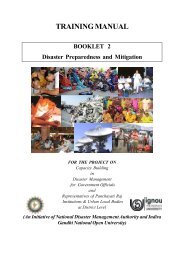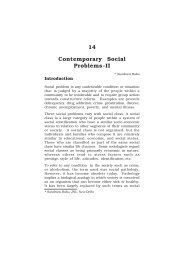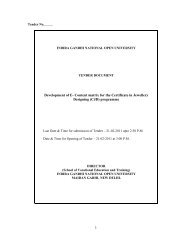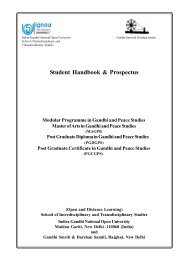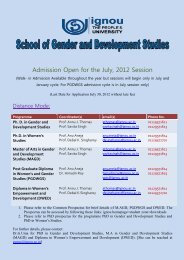Principles, Skills and Models of Group Work Practice - IGNOU
Principles, Skills and Models of Group Work Practice - IGNOU
Principles, Skills and Models of Group Work Practice - IGNOU
Create successful ePaper yourself
Turn your PDF publications into a flip-book with our unique Google optimized e-Paper software.
<strong>Principles</strong>, <strong>Skills</strong> <strong>and</strong> <strong>Models</strong> <strong>of</strong> <strong>Group</strong> <strong>Work</strong> <strong>Practice</strong> 213<br />
between the two. The concepts are ideas regarding<br />
individuals, groups <strong>and</strong> communities emerged from<br />
social <strong>and</strong> biological sciences as well as from the<br />
humanities disciplines. Such concepts are for example<br />
social distance, problem, role, ego, etc. They are basic<br />
to all social work methods. A principle is a verbalized<br />
statement, general rules or laws, fundamental truths<br />
by which we proceed from one situation to another. A<br />
principle must be understood to mean a hypothesis so<br />
adequately tested by observation <strong>and</strong> experiment that<br />
it may be put forward as a guide to action. Social group<br />
work principles are guiding assertions <strong>of</strong> statements<br />
that have come from experience <strong>and</strong> research. Basic<br />
principles <strong>of</strong> working with people in groups to help them<br />
grow <strong>and</strong> change have emerged from the practice <strong>of</strong><br />
social group work. The objectives <strong>of</strong> social group work<br />
can be fulfilled only within the frame work <strong>of</strong> principles.<br />
Therefore, it seems necessary to deal with basic<br />
principles, which are guiding force for group work<br />
practice. Douglas has described fourteen principles <strong>of</strong><br />
social group work.<br />
1) Recognition <strong>and</strong> subsequent action in relation to<br />
the unique difference <strong>of</strong> each individual.<br />
2) Recognition <strong>and</strong> subsequent action in relation to<br />
the wide variety <strong>of</strong> groups as groups.<br />
3) Genuine acceptance <strong>of</strong> each individual with his<br />
unique strengths <strong>and</strong> weaknesses.<br />
4) Establishment <strong>of</strong> a purposeful relationship between<br />
group worker <strong>and</strong> group members.<br />
5) Encouragement <strong>and</strong> enabling <strong>of</strong> help <strong>and</strong> cooperative<br />
relationship between members.<br />
6) Appropriate modification <strong>of</strong> the group process.





